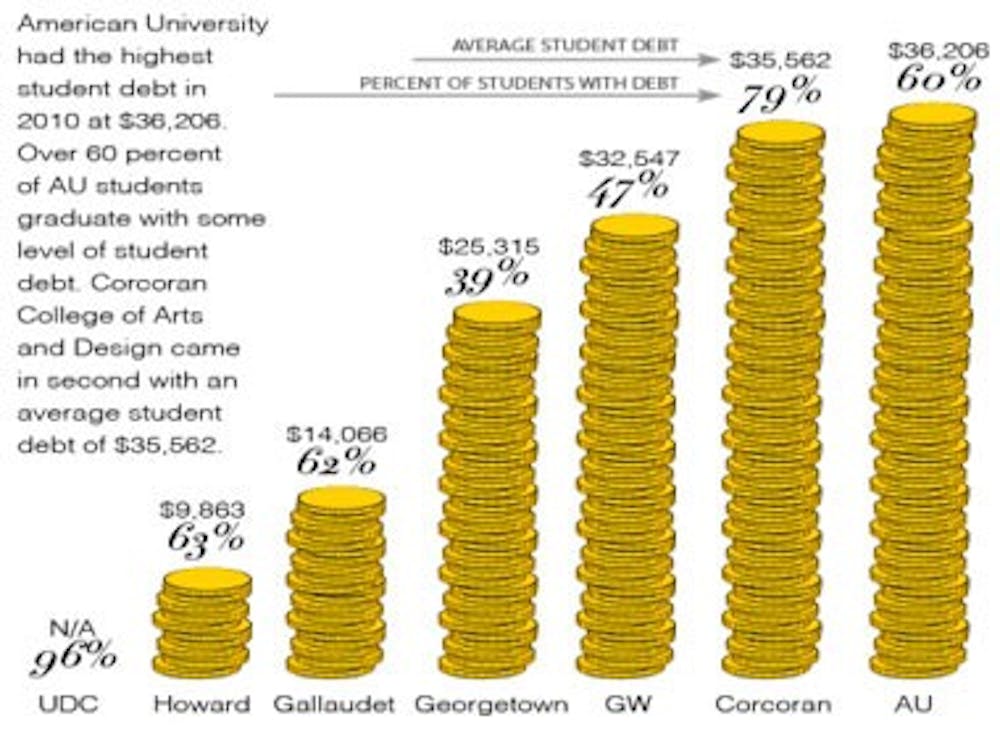Newly formed student movements such as A New AU and Occupy AU are calling for more accountability from AU administrators, and student debt is high on their list of grievances.
AU has the highest student debt average of all D.C. colleges and universities at $36,206 among 2010 graduates who took out loans, according to the latest report by The Project on Student Debt.
The average student debt of 2010 graduates for all public and private D.C. universities was $24,191.
Corcoran College of Art and Design graduates averaged $35,562 in debt, while George Washington and Georgetown University students graduated with $32,547 and $25,315 in debt.
Student Government President Tim McBride said SG recognizes the high debts AU students bear.
“It is unacceptable,” McBride said. “It is a major priority for us.”
Administration asserts honest and inclusive debt reporting
AU’s debt average is relatively high because the University reports every loan students take out, no matter the type of loan, said Director of Financial Aid Brian Lee Sang.
Lee Sang said that organizations that collect and publish student debt and financial aid statistics, such as Project on Student Debt and The College Board, ask general questions that leave a lot of room for interpretation.
Lee Sang said he knew for a fact that other schools choose not to include certain information, such as federal Parent PLUS loans, private loans or other alternative loans, in their student debt reporting, which in many cases could make their average indebtedness higher than AU’s.
“At AU, we report everything,” Lee Sang said. “We’re trying to be as straightforward as possible.”
AU is unique in its comprehensive reporting of student debt, according to Lee Sang.
“Other colleges are definitely underreporting,” Lee Sang said. “It certainly makes them look good, but I’m not sure if it’s completely accurate.”
For confidentiality purposes, Lee Sang did not want to disclose the names of those underreporting universities.
Students call for more transparency amid tuition hikes
Shirleyne McDonald, associate director of Financial Aid, said the University is aware of the economic impact debt has on students and families and encourages students to come talk to the Financial Aid office early in their academic years if they have concerns.
She said 98 percent of all-incoming freshmen that demonstrated financial need had their needs fully met in the 2011-12 academic year.
According to University officials, 18 percent of the University budget has gone towards providing financial aid for the 2011-12 academic year, and tuition and fees comprise 95 percent of the University’s overall budget.
“One of the reasons why I came to American is because they gave me such a good financial aid package,” said School of International Service junior Sabreen El Shrafi.
But El Shrafi noted that the amount of aid she received had decreased each year since her freshman year.
“They’re increasing tuition each year, too,” she said.
Cody Steele, a senior in SIS who leads the newly formed Occupy AU group, said he believes the administration did not give proper justification for a tuition hike the past few years.
“We want more transparency,” Steele said. “We want to know why tuition went up 12.7 percent over the course of my four years and where that money is going, because I’ve taken out substantial loans to be here.”
Tuition rose by 3.8 percent for the 2011-12 academic year and will rise another 3.8 percent for 2012-13, according to the February 2011 AU budget report.
McDonald acknowledged that, while AU’s tuition rose last year, it was still below the national average 4.6 percent increase.
Ethan Miller, a junior in the College of Arts and Sciences and a member of A New AU, doesn’t think a relatively lower rate of tuition increase is good justification for a rise in tuition.
“Just because other schools are raising tuition doesn’t mean we have to,” Miller said. “American could be a sort of revolutionary force in changing the system.”
Miller said that, by not increasing tuition, the University could create an appealing image of a school that is socially conscious of the needs of students in a downturned economy.
SG replies to debt concerns
Brett Atanasio, SG’s speaker of the Undergraduate Senate, said that issues of tuition and student debt are hard to address, especially in a weak economy.
“Lowering tuition is nice, but it’s not entirely feasible because the University needs to make sure it’s financially stable,” Atanasio said.
McBride mentioned some ways SG is working to help alleviate student debt, including creating a need-based civic engagement scholarship that offers $2,000 for students involved in community service at AU or in the D.C. community.
SG has also formed a committee to review University spending. The committee is composed of eight students and is in a fact-finding stage right now, McBride said.
When asked if he believes the AU administration is making an active effort to address student debt, McBride stated the administration is making progress on the issue.
“I think there’s more they can do,” McBride said. “There’s always more they can do.”
Atanasio pointed out that the cost of attending colleges has risen everywhere, making student debt an issue not endemic to AU.
“I think the high costs are something that frustrate everyone, no matter what your socioeconomic status is,” Atanasio said.
lnam@theeagleonline.com





